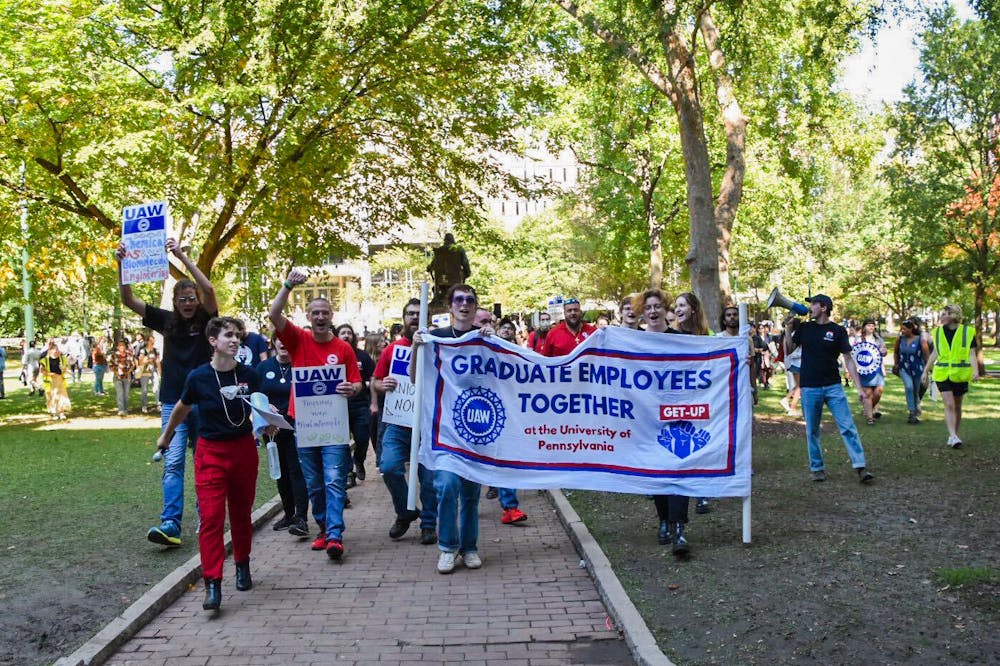
Throughout 2023, employees from across the University advocated for better working conditions and representation. From residential advisors to Penn Medicine residents, Penn saw an increase in union organizing across the University.
Residential advisors
March 15 — A supermajority of residential advisors and graduate resident associates filed for union recognition with the National Labor Relations Board, arguing in a press release that they were “consistently undervalued and unpaid.”
March 26 — The University argued that RAs and GRAs were not employees, but instead serve in a “student leadership position.”
March 31 — United RAs at Penn organized a rally in support of the RA and GRA efforts to unionize at Penn, attended by approximately 70 students, community members, and local politicians.
Aug. 21 — The NLRB officially recognized RAs and GRAs as employees, formally allowing them to vote on unionization.
Sept. 28 — RAs and GRAs voted to unionize under the Local 153 branch of the Office and Professional Employees International Union.
Oct. 6 — The NLRB officially certified the union election of RAs and GAs, allowing the workers to enter negotiations with the University.
Penn Med residents and fellows
Feb. 17 — Over two thirds of the 1,400 residents and fellows in the University of Pennsylvania Health System began unionization efforts through the Committee of Interns and Residents.
March 22 — Penn Medicine leadership pushed back on efforts to unionize leading up to the NLRB election by hiring a law firm specializing in union avoidance and publishing a website offering information “developed to provide factual information about unions” — which organizers said carried clear anti-union sentiments.
May 8 — Over 1,000 Penn Medicine residents and fellows participated in a vote to unionize, ultimately landing in favor of union recognition, 892-110.
May 31 — Penn Medicine residents and fellows prepared for the bargaining phase of their union campaign.
Graduate student workers
April 24 — 1,900 doctoral, master’s and undergraduate student workers signed authorization cards. The group, which is called the Graduate Employees Together at the University of Pennsylvania, aims to join the United Auto Workers union.
April 26 — Hundreds of graduate student workers attended a rally in support of union recognition in front of College Hall.
June 8 — Penn’s chapter of the American Association of University Professors called on the administration to adopt a policy of neutrality regarding graduate student unionization to avoid interference with the voting and decision process. This came in response to what AAUP-Penn President Amy Offner referred to as “anti-union” web pages published by the University over the summer.
Oct. 4 — GET-UP organized a rally, attended by roughly 300 Penn community members, before attempting to enter College Hall to deliver a letter to President Liz Magill detailing their intention to unionize. The letter, with nearly 500 signatures, was delivered by about 14 organizers who were allowed into the building.
Oct. 6 — GET-UP filed 3,000 authorization cards with the NLRB to request formal union recognition.
Oct. 15 — Graduate student workers criticized Penn’s “anti-union” web pages, featuring “frequently asked questions” about unionization.
Oct. 25 — GET-UP expressed frustration with Penn’s argument for the exclusion of over 1,000 workers, including Educational Recipient Fellows, from its union proposal.
Nov. 3 — Penn argued in to the NLRB that certain first- and second-year graduate students did not qualify to be considered employees in GET-UP’s unionization efforts.
Labor Advocacy
Feb. 9 — Falk Dining Hall workers demanded better treatment and payment from the University, citing a desire to be fully integrated into the Penn Dining system rather than treated as third-party workers.
Nov. 30 — Employees of the Steinberg Conference Center called their work environment toxic and hostile, recounting mistreatment towards housekeeping workers that one anonymously compared to being treated like “slaves.”
Check out the rest of the DP’s Year in Review content here.
The Daily Pennsylvanian is an independent, student-run newspaper. Please consider making a donation to support the coverage that shapes the University. Your generosity ensures a future of strong journalism at Penn.
Donate







